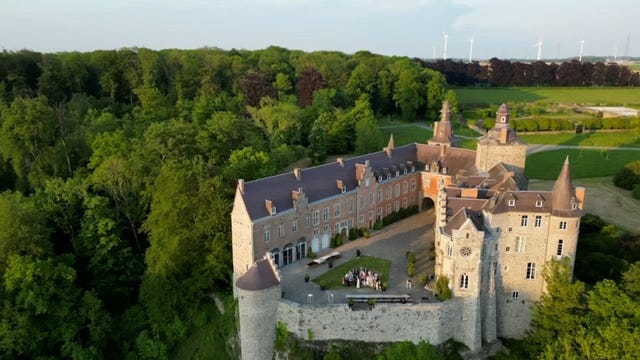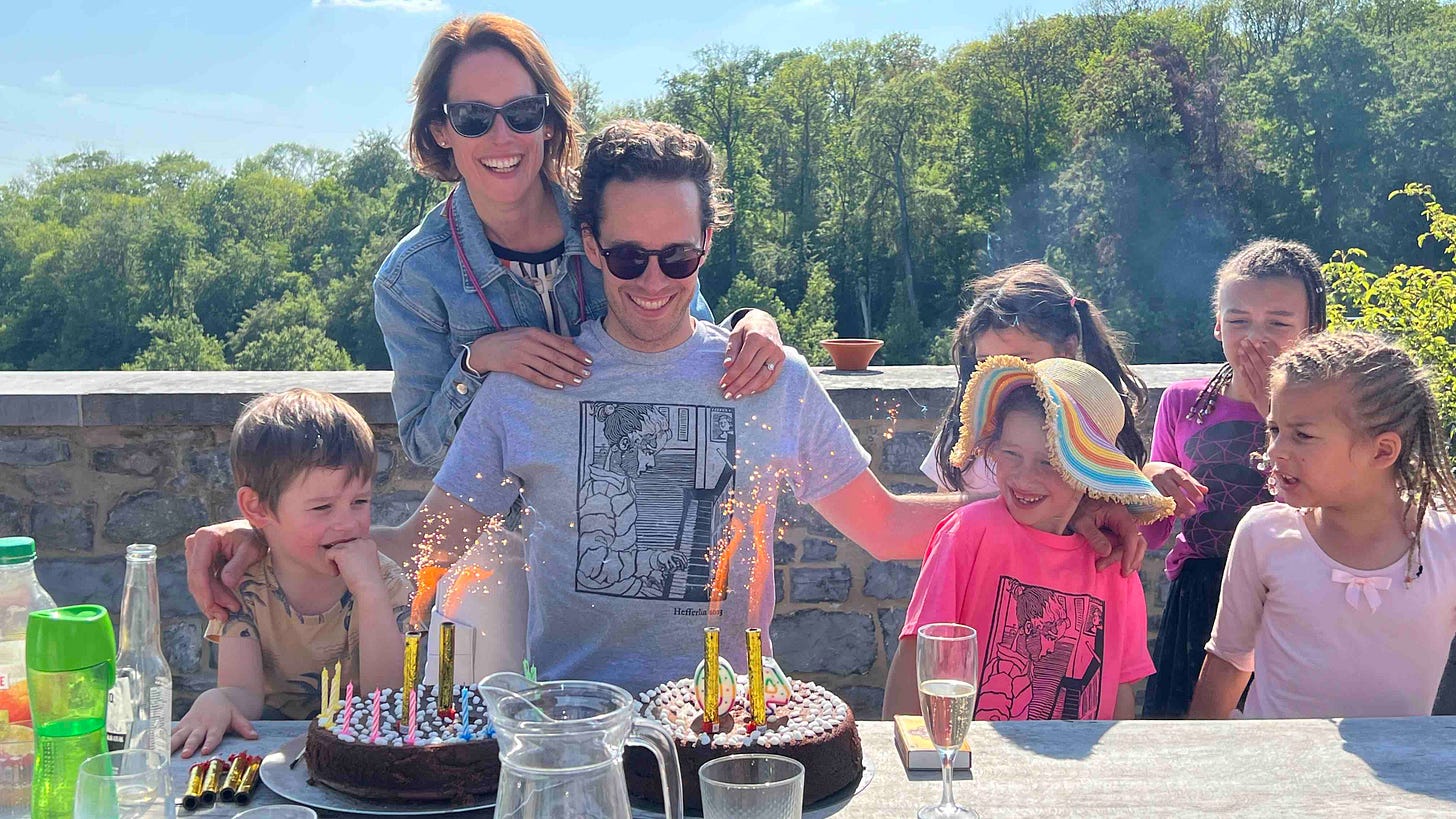There are many great things our off-grid life in rural Portugal gives us, but sometimes parachuting into another place with other people reminds us how different we have become.
Ana and I are not known for living in normal places and working nine to five (what a way to make a living?), but I enjoyed a moment of self-refection while we spent a sunny Sunday afternoon drinking beer brewed by monks and eating steak tartare on a rural Belgian golf club terrace.
Apart from red/orange trousers, I had little in common with the Belgian golfers hammering balls down the practice field with differing levels of success...except, of course, for the ones who weren’t very good at golf.
Golf-terrace-life may be normal in many places, but being alien to us, we headed to the nearest village petrol station to chose from a wall of Belgian beers and then drank them under a beautiful linden tree on the golf course enjoying Belgium’s first weekend of sunshine.
It’s funny, I thought, how Brexiteers and in-the-heart-of-Europe Europeans both wear red trousers, where COVID is such a distant memory that everyone kisses everyone they greet, and there are places where you can hire a clifftop castle for a weekend on AirBnB.

The occasion of our Belgian break was the fortieth birthday of our great friend Lukas, who with his wife and our old pal Aela know how to put on a very good party, on this occasion at Chateau Mielmont and arriving later than most, we stayed at the nearby golf hotel.
Friday and Saturday featured barbecues, speeches, fireworks, generous pourings of wine and champagne, and a theme of “I don’t believe I’m wearing this.”
It involved a host of old friends and a clutch of even more new-to-us smart people who do proper jobs in proper places.
Machine learning up-starters, spin-doctors, diplomats, artists, educators, UN experts: weekend visitors from Amman, Cairo and Melbourne – yes, just in for the weekend – and all wearing outfits they would rather not share pictures of on LinkedIn.
As much as I try to stop myself, I’m so obsessed with our current water mineral content levels it’s hard not to disappear down rabbit-sized bore-holes when making polite “so what do you do” conversation.
A number of times I caught myself ending a long rant with the phrase: “so now we’re going back to the idea of reverse osmosis...”
When people feign interest and nod without looking over my shoulder it merely encourages me: “so we’ll need three separate water lines into each house and can use the residue salt water in the pool – great eh?”
“Interesting,” polite people reply.
As regular readers know, I continue to be laughingly rubbish at the off-grid thing, and some of the self-deprecating stories do keep real people listening, but it helps when they’re trapped in the corner battlement of a castle where the only escape is leaping into the valley below.
I also found myself keen to ensure Portugal was properly represented in the face of all this northern European-ness.
“Call that a monastery?” I inexplicably said to Aela, while touring Maredsous Abbey, one of the most famous monasteries in Belgium which happened to be just half an hour down the road, but only built in 1872.
“We went to one recently in Alentejo that dates from the 1500s and is so much bigger,” I said for some odd reason.
It was an amazing Abbey – with a fantastic tour guide who explained the importance of religious crooks and why they point different directions, how the history of western Europe is told through what's depicted on Euro notes and the strict rules defining what can be called a Trappist beer.
And after all, there’s no real competition: the reason spring is so vibrantly green in Belgium is that winter is so terrifyingly wet and grey.
Hark at me: not even three years living in Portugal and already playing the “my monastery is older than your monastery” game.
It was an educational weekend: I learned just how many German hospitals fake their invoices, how half of Mexicans get paid in cash, how expensive mezcal is more subtly smoky than the cheaper stuff and that Belgians eat a lot of cheese.
Belgian croquettes – especially the cheesy ones – are a bit like the Irish sport of hurling: if you grew up with it you can safely participate, but if not it can be extremely dangerous to stomach.
It’s perhaps the combination of the croquettes, the raw meat and the monk-u-factured cheese (served with their beer) that made by tummy ache - longing for a session of hurling - once we made it to Sweden.

We flew into Stockholm and took the cross-country train to surprise Ana’s stepdad Christer for his 71st birthday – traditionally a significant one after we did the same for her mum two years ago (when COVID had kept us away from her 70th).
Gertrud picked us up at the nearest station a little after 9pm after a sneaky switcheroo of cars to ensure Christer didn’t suspect anything.
We tiptoed around to surprise him at the kitchen table and slipped into the house delighted to hear the buzz of his Stihl strimmer and that he was still out in the fields cutting grass.
We waited in anticipation...
The strimming continued.
We turned off the lights to avoid detection and then waited a little longer...
The sound of strimming stopped; we got ready; the sound of strimming started again.
Then it got properly dark. The cutting continued.
It was 10.45pm before Christer returned to the house, exhausted and extremely (and happily) surprised to see us.
On his last day of being 70 he was strimming into the night...it’s exactly this kind of hard-working, determined rural living which inspired us to move to the countryside.
They also have a lot of great toys. I say toys, but this is proper farming.
Peak sheep is now over 80, the rye crop is tall and straight, and today Christer will be spinning yesterday’s cut grass into lines ready for bailing as Gertrud clips some sheep toenails and weighs the last three smallest lambs to see if they still need bottle-feeding.
They’ve been doing it more than a decade since Gertrud retired as a GP and they moved from the east to the west coast of Sweden to follow their dream.
Now they are definitely farming, as opposed to planting a few dozen trees and talking a lot about planting a vineyard.
They are fit and strong, look younger than ever and don’t drink very much wine.
I live in the hope that they had no idea what they were doing when they started, but I doubt it.
Staying at Rya Gård farm is a great refresher course in countryside stuff.
As well as detoxing with healthy home-grown food (and no croquettes) and collecting milk just one step away from the teat, Christer taught me how to set up an electric fence, and which strimmer wire to use to cut well with minimal plastic waste.
He was surprised by my speedy hole digging for wooden posts, but their land isn’t clay and it was a lot easier than digging our olive grove.
And while on the west coast of Sweden we took the week full circle by visiting Lennart and Marie Linnér at their summer house.
Lennart was Swedish ambassador to Thailand (and Ana’s old boss and dive buddy) when he married us in Bangkok a shade over 12 years ago - when we first met Aela and Lukas and friends.
Despite being retired from the foreign service, Lennart is heading to Ukraine next month for a temporary posting to bridge a departing and an arriving ambassador.
We talked about the friends we’d seen at a castle in Belgium, reminisced about the madness of Thai street protests back in the day and think we’ve done enough to lure them to The Valley of the Stars next year (once the pool is open!).
Next stop for us on our European excursion is Copenhagen, from where we’re flying back to the valley, the dogs, the cats, and with huge thanks to Misha and Daniel for keeping an eye on everything for us.
And finally...it was great to get so much feedback last week about Artificial Intelligence and the end of the world as we know it.
I may have mocked, but with thanks to Ola for this YouTube video and to The Economist for this timely essay, Yuval Noah Harari’s predictions are as convincing as they are scary.
“New AI tools have emerged that threaten the survival of human civilisation from an unexpected direction,” he says.
“AI has just hacked the operating system of human civilisation: language.”
I take it all back: be afraid, be very afraid.









